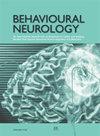Metformin Alleviates Autistic-Like Behaviors Elicited by High-Fat Diet Consumption and Modulates the Crosstalk Between Serotonin and Gut Microbiota in Mice
IF 2.7
4区 医学
Q2 CLINICAL NEUROLOGY
引用次数: 11
Abstract
The biological mechanisms linking diet-related obesity and autistic behaviors remain unclear. Metformin has proven to be beneficial in the treatment of many syndromes, including autism spectrum disorder. Therefore, the aim of this study was to assess whether metformin treatment could ameliorate metabolic and behavioral alterations in C57BL/6 mice kept on a high-fat diet (HFD), and whether these changes were related to modifications in the gut microbiota and 5-HT levels. As expected, ten weeks of HFD ingestion increased body weight, adiposity, and glucose levels. HFD-fed mice showed a marked aggravation of repetitive behaviors (marble burying and self-grooming), and this was prevented by metformin administration. In addition, HFD-fed mice increased the total distance travelled in the open field test. This hyperactivity was counteracted by metformin cotreatment. In the elevated plus maze test, HFD-fed mice showed a reduced number of entries into the open arms. Interestingly, both HFD and metformin cotreatment increased social interactions in the three-chamber test. HFD increased the levels of intestinal tryptophan and 5-hydroxyindoleacetic acid. Metformin stimulated gut tryptophan and promoted the synthesis of 5-HT in the HFD group. Lactococcus, Trichococcus, Romboutsia, and Faecalibaculum were enriched in HFD-fed mice, whereas the HFD group cotreated with metformin was enriched in Intestinimonas and L. reuteri. Faecalibacterium was positively correlated with sociability and 5-HT pathway components in mice that received metformin. In summary, HFD consumption elicited a complex phenotype comprising higher levels of anxiety-like and repetitive behaviors but also increased sociability. Metformin could potentially improve HFD-induced disorders in the autistic spectrum through a mechanism involving positive modulation of 5-HT levels in the gut and its microbiota composition.二甲双胍减轻高脂饮食引起的自闭症样行为并调节小鼠血清素和肠道微生物群之间的串扰
与饮食相关的肥胖和自闭症行为之间的生物学机制尚不清楚。二甲双胍已被证明对许多综合征有益,包括自闭症谱系障碍。因此,本研究的目的是评估二甲双胍治疗是否可以改善高脂饮食(HFD)C57BL/6小鼠的代谢和行为改变,以及这些变化是否与肠道微生物群和5-HT水平的改变有关。正如预期的那样,摄入HFD 10周会增加体重、肥胖和血糖水平。HFD喂养的小鼠表现出重复行为(大理石掩埋和自我梳理)的明显加重,二甲双胍可以防止这种情况的发生。此外,HFD喂养的小鼠在开阔地试验中增加了总行程。二甲双胍联合治疗抵消了这种多动症。在高架迷宫试验中,HFD喂养的小鼠进入张开双臂的次数减少。有趣的是,在三室试验中,HFD和二甲双胍联合治疗都增加了社会互动。HFD增加了肠道色氨酸和5-羟基吲哚乙酸的水平。二甲双胍刺激HFD组肠道色氨酸并促进5-HT的合成。乳球菌、毛球菌、Romboutsia和Faecalibaculum在HFD喂养的小鼠中富集,而与二甲双胍联合治疗的HFD组在肠杆菌和路氏乳杆菌中富集。在接受二甲双胍治疗的小鼠中,粪便杆菌与社交能力和5-HT通路成分呈正相关。总之,HFD消费引发了一种复杂的表型,包括更高水平的焦虑样和重复行为,但也增加了社交能力。二甲双胍可能通过积极调节肠道中5-HT水平及其微生物群组成的机制,改善自闭症谱系中HFD诱导的疾病。
本文章由计算机程序翻译,如有差异,请以英文原文为准。
求助全文
约1分钟内获得全文
求助全文
来源期刊

Behavioural Neurology
医学-临床神经学
CiteScore
5.40
自引率
3.60%
发文量
52
审稿时长
>12 weeks
期刊介绍:
Behavioural Neurology is a peer-reviewed, Open Access journal which publishes original research articles, review articles and clinical studies based on various diseases and syndromes in behavioural neurology. The aim of the journal is to provide a platform for researchers and clinicians working in various fields of neurology including cognitive neuroscience, neuropsychology and neuropsychiatry.
Topics of interest include:
ADHD
Aphasia
Autism
Alzheimer’s Disease
Behavioural Disorders
Dementia
Epilepsy
Multiple Sclerosis
Parkinson’s Disease
Psychosis
Stroke
Traumatic brain injury.
 求助内容:
求助内容: 应助结果提醒方式:
应助结果提醒方式:


